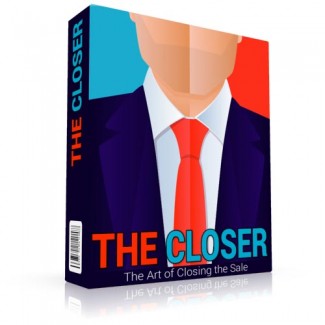 License Type: Personal Use
License Type: Personal Use  File Size: 4,421 KB
File Size: 4,421 KB File Type: ZIP
File Type: ZIP
 SKU: 53222
SKU: 53222  Shipping: Online Download
Shipping: Online Download
Ebook Sample Content Preview:
So far we covered a lot of essential background information that is necessary to laying the groundwork for a close. Now we are going to move on to the meat and potatoes and talk about the actual close itself. The process itself is deceptively simple. There are no secrets or tricks to doing it correctly. Despite this, there are an amazing number of salespeople who drop the ball right here on the goal line.
The essence of a successful close is knowing when to ask for the customer's business. Like asking someone out on a date or to get married, there is no "right" time. Instead, you have to plan your moves and feel out the situation before you pop the question. Your instincts have as much to do with the chances for success as anything else. An ill-timed close is about as uncomfortable for all involved as an unwanted marriage proposal.
Again, you have to do your homework. If you've laid the proper groundwork, knowing when to close is a breeze. The moment to do so will come naturally and inevitably as day following night. However, if you get lazy and you don't do your prep work the moment to close will never occur naturally or otherwise. You will have to try and force the close from an unwilling client. This forced action, more likely than not, will lead to a failure to close. So, let's take a quick look at those prep steps one more time.
First, focus on the prospect and their problem, not on you and your need for a sale. The sales process revolves around the customer. You, the salesperson are there for one reason and one reason only - to facilitate the solution to the customer's problem. That's your purpose. That's your role, nothing more and nothing less. If you solve the customer's problem, you close the sale.
Second, listen to your customer. If you listen to your customer, you get to know your customer. If you know your customer, you have the opportunity to develop a relationship with them. This relationship, in turn, leads to increased trust. Finally this trust increases the chance for a successful final act to the sale cycle.
Additionally, when you listen to your customer, you are learning both the nature of their problem and how they want you to solve that problem. These two pieces of information are critical to a successful close and your customer, more often than not, will hand them to you, but only if you shut up and listen.
Speaking of shutting up, when it's time to close shut your mouth. Simply smile, ask for the customer's business as if it's a foregone conclusion and wait. Don't say another word. Far too many inexperienced salespeople have talked their way out of a close by failing to shut their mouths. You don't need to be giving the customer any further information at this point. If you've done your job and focused on and listened to the customer, you've already acknowledged their problem and offered a solution. Give them the opportunity to accept that offer.
Finally, once the customer agrees, seal the deal by forwarding any necessary paperwork promptly. Remember there is no deal until the ink is dry on the bottom line of any contract. Also, don't be afraid to ask for referrals from your customer. A satisfied and happy customer will be more than willing to give you referrals or recommend your services to colleagues. These referrals and recommendations can yield valuable new leads and we all know how important leads are to the sales process. Don't be afraid to ask.
Takeaways for This Section
Timing is of the essence when it comes to a successful close. If you've done your job, your instincts will tell you when the moment is right to "pop the question";
A salesperson is a facilitator and nothing more. A closer knows this and brings his or her focus to the customer and their problem, not onto their need for a sale;
Listen to your customer and develop a relationship based on trust. This will pay dividends when it comes time to close;
Listen to your customer some more. They will tell you their problem and how to solve that problem. Armed with that information, a closer is unstoppable;
Smile, ask for the customer's business and shut up. If you've done your job, the outcome is guaranteed and needs no further help from you;
Follow up after the close with any paperwork to legally seal the deal. Also ask for referrals and recommendations. They are an excellent source for new leads.
Sales Myths or What Not to Do
Now that you know pretty much everything you know to become a more successful closer, you need to take a look at a couple of sales mistakes. These are things that you should never do if you want to successfully close a deal. These are the mistakes that many unsuccessful people make time and time again. If you don't want to become the anti-closer, avoid these missteps like the plague.
Your Brochures and Website Don't Matter to the Customer
Sure you probably have all kinds of handouts and online information available for your customer to peruse. Don't mistake these materials for actual salesmanship. Anyone can read a brochure to a customer or direct them to a website. If the brochure or website was all the customer needed to purchase your product or service then you'd be extraneous. You are the bridge between the customer and what you are selling. The sales materials are there simply to generate leads and attract interest. You are the motive force when it comes to generating sales.
Make Sure That You're Talking to the Right Person
You put a lot of time and effort into making a sale. You got to know the customer, and established trust by focusing on them and not on you. You listened to the customer and noted their problem and how they'd like that problem solved. Now, when it comes time for the close, you belatedly realize that the person you've been dealing with for all this time is not the person who is able to make the final decision regarding the sale. Talk about wasted time and effort. Figure out who calls the shots when it comes to saying yes to your sales pitch ahead of time. You'll end up with a lot more money in your pocket and a lot less egg on your face.
- File Size:4,421 KB
- License: Personal Use
- Category:Ebooks
- Tags:2015 Ebooks Personal Use








